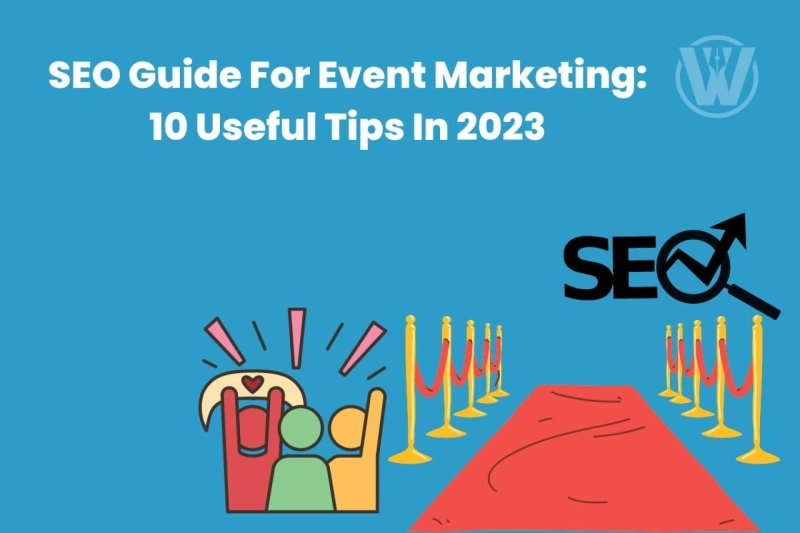There is no doubt that events are an integral part of marketing campaigns.
So, every company must organize its events. In the wake of COVID-19, more events, like webinars and live shows, have become online.
But, brands and marketers find it challenging to make it popular and get more participants. That's where SEO comes in.
When your event gets the top rank on a search engine, more people come to know about it. Also, adding events creates a good reputation for a brand that benefits a brand online.
You’ll learn how to promote events using SEO that will make your events rank at the top of the search engine results in this SEO guide for event marketing.
Your SEO Guide For Event Marketing: 10 Ways To Optimize Your Event For SEO
1. Choose Your Target audience
Every SEO activity targets a particular audience section, so events are no different.
The first step for event SEO should be to identify your target audience. It can be the people who might be interested in your event or the audience for whom you have organized the event.
You can even conduct market research to analyze your existing customer base and analyze competitors. Consequently, you can make a profile for your target audience for SEO strategy.
After identification of the target audience, you can identify their behaviors, interests, and demographics. These details are vital to creating content for SEO. You can also optimize your website for that audience and tailor your content to meet their needs.
All these activities help to meet the needs of the target audience better and increase the chances of ranking higher on the search results.
2. Choose Relevant Keywords
Here is an interesting fact: 93% of an online session for a user starts when they search for a keyword online.
Keywords are essential as they help search engines understand the theme and content of your website. Also, it will help you understand how your content is helpful for a user's search query.
Some easy steps to use keywords in your website are:
Begin with a keyword search using keyword research toolsEmphasize user intentUse long tail keyword Consider locationUse keywords in website contentInvolving relevant keywords in your website and content related to your event increases its chances of ranking higher. Moreover, it boosts visibility and brings more traffic to inform people about your event.
3. Produce Event-Specific Content
After defining your target audience and choosing keywords, you need to use those details to produce event-specific content for SEO events.
You can inform the search engine and audiences about your event details using event-specific content. By event-specific content, we mean the event's date, location, and description.
If you are planning a business event, you can add the objectives and structure of the event. The keywords can be added to the content. So, the people who may be searching for those keywords will know about your event.
When you optimize your content with keywords and relevant content, search engines will automatically make it rank higher. A higher rank helps enhance that web page's visibility with organic traffic. Apart from the audience, it helps to bring more sponsors and media coverage too.
4. Use Local SEO
How will the local people know about your event? The answer is local SEO.
Local SEO helps search engines and audiences know about the event's location and content. For local SEO, you can list the event in local online directories, using local keywords, online reviews, and local backlinks in the event's presence online.
All these activities can increase the visibility of the event and local search results for the local people. Consequently, it will be easy for potential attendees to find out about the place of the event.
Also, it creates a trustworthy and credible image for the event. A higher credibility will enhance potential attendees' chances to register and attend the event.
5. Promote The Event Online
There are various other alternatives to promote an event that also contributes to SEO.
You can create a new website with a new web page on your existing website dedicated to the event. Ensure that the web page offers all details about the event to the potential attendees becoming the base for event promotion.
Along with webpages, you can use social media platforms like Facebook, Twitter, and Instagram. These platforms will enable you to reach a more extensive section of audiences to promote your event.
You can provide details about the event and share updates, behind-the-scenes pictures, and videos. All these posts help to create interest and excitement for an event.
Most brands use email marketing to send invites and inform the target audience about an event. You can create a list of interested individuals from your records and share regular promotional updates about the possibility with them.
6. Try Schema Markup
Have you ever heard about schema markup?
Schema markup is a code that makes search engines aware of the context of your event. It makes it easy for the website or event web page to appear in search results.
You can use the relevant schema type for schema markup, like the 'Event' schema. It details the event's title, location, date, and description.
Consequently, you can use a validation tool to ensure that this structured code is aptly formatted with all the necessary details.
7. Include Events On Third-Party Websites
It takes time for your website or event's web page to rank higher. Until then, you can include your event details in various listing directories online from your industry and geographic location. Some popular listing websites are Eventbrite, Meetup, and Bandsintown.
Just create an account on these listing websites and add the necessary information about the event. Consequently, your event will be listed based on its name, date, location, description, and image.
Everyone reading this listing will get to know about your event. Furthermore, you can share the link of that event listing on other third-party websites, your website, and social media platforms.
All these activities will bring more traffic and visibility. Moreover, keep updating details and images about your event for better reach.
8. Use Strong Backlinks
Backlinks are important to increase your website's organic search engine rankings. You can select appropriate websites and influencers in your niche and reach them. Make offers like making a guest post for backlinks.
Review and analyze the performance of your backlink daily, and make sure the link is active. It helps for improving event SEO.
Another benefit is that it helps to build relationships with other websites and influencers in your industry. So, it may bring more backlinks after some time.
Further, it would help if you used these backlinks in on-page optimization for your SEO strategy.
9. Optimize For Mobile
Facts say that 92.1% of internet users access the internet using a mobile phone. So, pay attention to this fact, and make sure you optimize your event SEO for mobile. Make the website with a mobile responsive design that adjusts with different screen sizes.
Also, improve your website's loading time or page speed by compressing images because mobile users don't have to wait for more time.
You may use CTAs that are easy for mobile users to understand. Moreover, make sure you share the social media posts and pages on the event with mobile users. Lastly, create user-friendly navigation for your website.
10. Review Performance
After working on all the steps for Event SEO, you need to review the performance of those activities daily. The review will help you understand and work on anything that is lacking. The following steps can help review your event SEO performance quickly.
A. Track website traffic: Like any other website, you can use Google Analytics to track the number of visitors to your event webpage. You take that into account and act accordingly.
B. Check keyword Rankings: To analyze the performance of your keywords, you can use a keyword tracking tool. It will help you understand whether your keywords are driving results or not. Here SEO tools will play a crucial role.
C. Check backlink profile: Since you use backlinks for event SEO, you need to use backlink analysis tools to check their quantity and performance.
D. Keep a tab on conversion rates: Use tools like Google Analytics to check your event website's conversion rates. It can include checking the number of newsletter sign-ups or registrations for the event.
Summing Up: SEO Guide for Event Marketing
We have reached the end of this article. So, you would have understood how to optimize your website for event SEO and promote your event.
This SEO guide for event marketing is a must for SEO events and event planners to inform your target audience about your event.
It won't be wrong to say that the number of internet users is drastically growing, and nothing can be better than SEO to increase the event's visibility.
SEO Guide For Event Marketing: FAQs
What is SEO optimization in event marketing?SEO optimization in event marketing refers to improving the visibility and ranking of your event website or promotional material in search engine results pages (SERPs).
What are the key elements of SEO optimization for events?The key elements of SEO optimization for events include:
Having a well-designed website.
Using relevant keywords.
Creating quality content.
Having a clear call to action.
Optimizing your website's loading speed.
Having high-quality links pointing to your site.
Ensuring that your website is mobile-friendly.
Choosing the right keywords for your event website involves researching what people are searching for when they look for similar events. You can use keyword research tools to find the keywords most relevant to your event and are being searched for frequently.


